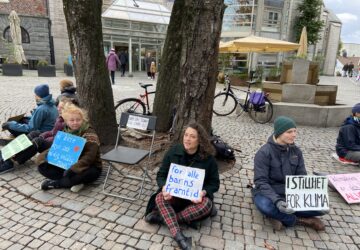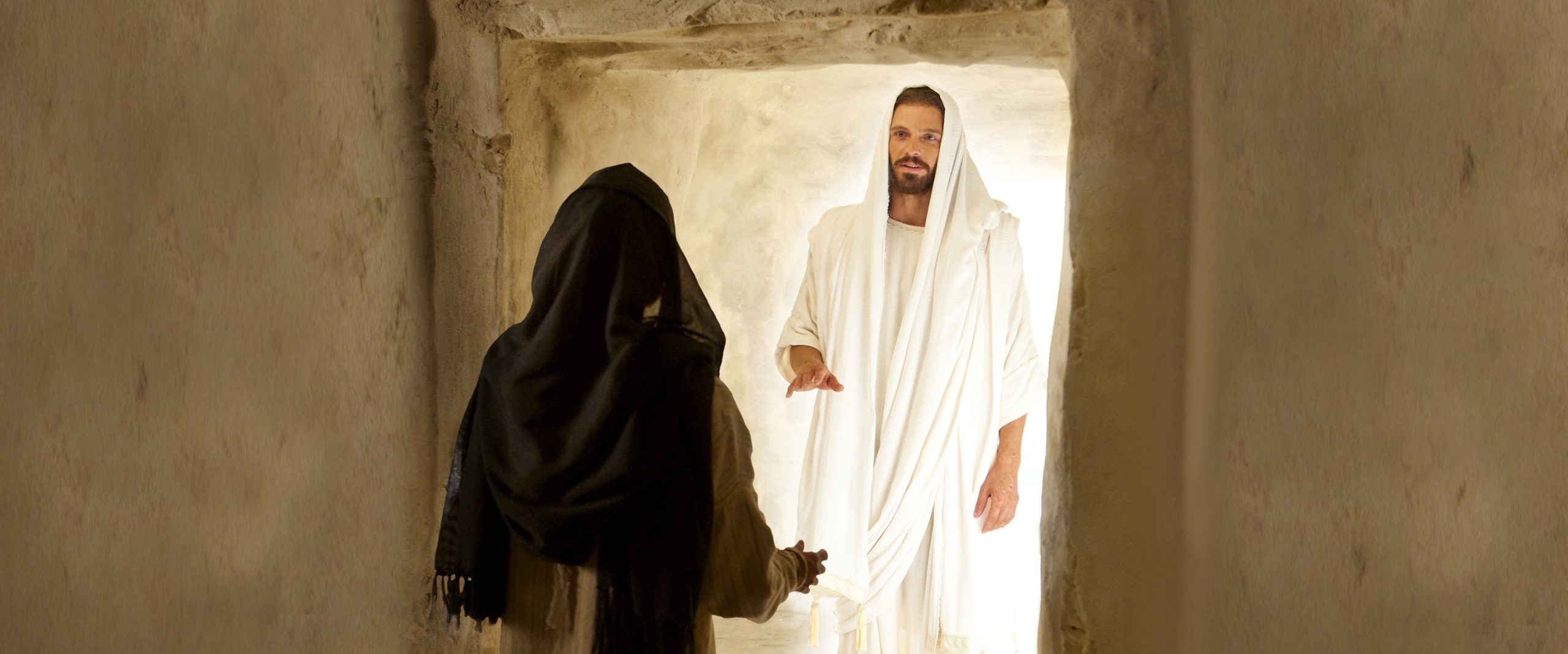Easter is over, and I have been pretty much logged off for most of it, which is a good thing. I have been wanting to share some thoughts and feelings about Easter, but it has just been hard to pull them together. Even though we have stuck to our Easter traditions (see here and here), we have been somewhat preoccupied with Simen’s imminent departure, and the shear logistics of holiday comings and goings. So I was rather grateful when a dear friend, Chris Hill, asked me to take a look at his translation from English to Norwegian of the talk he would be giving in church Easter Sunday. It gave me a chance to ponder the magnitude of the Easter message, and to be reminded again of why I am so grateful for the knowledge I have of the Resurrection and the Atonement.
With Chris’ permission I would like to share his remarks here. Enjoy! I know I did!
Siggy: “Bob?”
Bob: “Yeah?”
Siggy: “Are you afraid of death?”
Bob: “Yeah.”
Siggy: “Me too. There’s no way out of it. You’re going to die. I’m going to die. It’s going to happen. And what difference does it make if it’s tomorrow or 80 years? Much sooner in your case…I’m going to die. You’re going to die. What else is there to be afraid of?” (“What about Bob?”)
This conversation between a young 12-year-old boy named Sigmund and an older gentleman in his 40’s, named Bob, takes place in one of my most favorite movies. The conversation ends with Bob giving the young boy a comedic list of the many other things, which are much better to be afraid of than death, and in so doing gives him a better outlook on life.
We all face the hard facts of death at some point in our lives. Whether it is your own death or that of someone you love, death can appear as a dark and troubling reality. Death is common to us all. Yet it is viewed as a bleak, final and fearsome experience. It is my hope today that, like Bob did for Sigmund, I will be able to gift all of you a better outlook on life-and-death matters.
I don’t intend to give you more things to fear. My message is about more things to love. I’m talking about the blessings and gifts of Christ’s resurrection.
In 1st Corinthians 15, the Apostle Paul devotes great energy to preaching about the resurrection. In his epistle, he points out several blessings we have received as a result of Christ’s sacrifice. To make his point more powerful, Paul lists everything about the gospel that would make no sense were it not for the resurrection. However, Paul then ends his epistle by proclaiming that Jesus lives: “But now is Christ risen from the dead, and become the first fruits of them that slept…For as in Adam all die, even so in Christ shall all be made alive.” (1 Cor. 15:20, 22)
This was revolutionary good news for the whole world! Since the fall of Adam and Eve in the Garden of Eden, every one of us has been subject to the finite measure of time. On Earth, we have a beginning at birth and an end at death. Additionally, Adam and Eve’s transgression in The Garden had spiritual consequences which cut them off from the presence of God forever. By extension, the rest of the human race suffers as well. We are born into this imperfect world and we too transgress the laws of heaven. Thus, not only will we die physically, but when we do we are unable to return to the presence of our Heavenly Father of our own accord.
How sad for anyone to think they are doomed to a permanent death both physical and spiritual! How depressing to believe that the sum total of our existence is to live and die; to never progress any further than what we accomplish in life.
Followers of Christ are among many others in this world who have faith and great reasons to believe that life and conscious existence do not end at death. Unfortunately, it appears that the percentage is declining of those in “Christian nations” worldwide who do believe in life after death. This is in spite of the growing number of persons worldwide who report having had the so-called “near death experience” of dying, moving spiritually into a new realm of existence, then returning to their bodies. (e.g., see, Near Death Experience Research Foundation) In terms of numbers of people who have had this experience, we are talking about millions.
So, are we really doomed? No! Every missionary, convert and primary child knows this isn’t the case. We know our Heavenly Father would never leave his children to suffer eternally. Those who suffer eternal damnation only do so because they choose to do so. But as the Apostle Paul said, “If only for this life we have hope in Christ, we are of all people most to be pitied.” (1 Cor. 15:19) In other words, the doctrines of Christ take us far, far beyond what happens in this life.
Fortunately, our understanding of eternal doctrines takes us far beyond the simple belief in a continuation of consciousness beyond the grave. Our Father has had a plan for us from the very beginning. Following that plan leads us to knowledge, progress, and eternal happiness. That’s why it is often called “The Plan of Happiness.”
However, this plan of happiness would make no sense at all if it were not for the atonement of Jesus Christ. This is what Paul meant in verse 17 of Corinthians 15 where we read “And if Christ be not raised, your faith is vain; ye are yet in your sins.” In order to make this plan workable it became necessary for us to have a Savior; someone who could speak up for us to the Father, show us mercy at the judgement without robbing justice, and most importantly wash us clean of our sins. Because of Christ’s sacrifice we are forgiven of our sins, and we are continually forgiven of our sins as we partake of the sacrament, take upon us the name of Christ, always remembering him, and striving to keep his commandments.
Because of the Atonement and resurrection, we are forgiven of our sins through repentance. Through his sacrifice we make of giving up our sins to know God, we are made whole. In Romans Paul put it another way, the he “was delivered [to justice] for our offences, and was raised again [to eternal life] for our justification [to make us right with God].” (Romans 4:25) All of us need forgiveness, every day. We desire to be accepted and loved by our Heavenly Father and yet we fear being cast away because of our guilt, but I want each of you to remember as Elder Holland once professed that for
“anyone seeking the courage to repent and change, I remind you that the Church is not a monastery for the isolation of perfect people. It is more like a hospital provided for those who wish to get well.” (“Come unto Me”)
And, I might add, in that hospital each of us serves the dual roles as pitiable patients as well as kind and loving nurses.
Because of Christ’s sacrifice and resurrection, our faith is not in vain! Without the atonement of Christ, our agency, our search for happiness and meaning in our lives, and our desires for eternal life would all be meaningless.
We all have personal experience with how difficult it can be to believe in something in the absence of fact; the absence of verifiable evidence. We have all had to face that friend, that family member, that stranger who challenges us to prove our faith is not based on a myth. We all want that knowledge, that firm testimony. We all want to be able to affirm without question, “I know!” And we can! Such knowledge and firmness is clearly within our grasp.
Jesus prophesied repeatedly that he would not leave us without hope. In Matthew he told his disciples of his coming betrayal which would lead to his crucifixion and resurrection. In John 2:19 he proclaimed, “Destroy this temple, and in three days I will raise it up”. Jesus knew he was born to die for us. He also knew that his death was not the end. He knew that through his resurrection he would fulfill the measure of his creation. He would create a passage into immortality, which we sometimes call “the portal of death.” Every human being born to this life eventually leaves their body behind and enters this portal into eternity.
Jesus did die, and he was raised again on the third day. Thousands have testified to his resurrection by firsthand experience of seeing the risen Christ.
- He was seen and heard by Mary
- He met the women on their way to tell the disciples about the empty tomb. To them he spoke. “And they came and held him by the feet, and worshiped him” (see Matt. 28:9–10).
- He walked and conversed with the two disciples on the way to Emmaus (see Luke 24:13–16, 28–32).
- He appeared to his apostles at least twice, once when Thomas was absent and again a week later when he was present. He talked to them, showed them his hands and feet. At his request, “they gave him a piece of a broiled fish, and of an honeycomb. And he took it, and did eat before them” (see Luke 24:36–43; John 20:26–29).
- He hosted the seven disciples at the Sea of Tiberias (John 21:1–22).
- On one occasion, he was seen by more than 500 people at once (1 Cor. 15:6).
- Of course, following his post-resurrection ministry in the land of Jerusalem, Jesus visited and administered among the Nephites in Bountiful (see 3 Nephi 11-27). (esp., 3 Ne. 17:25)
By telling us of these events before they happened and then fulfilling his promises, Jesus created in himself a person worthy of our absolute trust. Jesus Christ lives and will always be there for us. If we ask and open ourselves to him, he will stand by us and make himself known unto us. All that is required is “a sincere heart, with real intent, having faith in Christ….” (Moroni 10:4)
Because of his resurrection, we also know the words of the apostles to be true. We are frequently confronted by those who would tell us that there is no absolute truth, no truth that is an inflexible reality, fixed, invariable. John Piper, the chancellor of Bethlehem College and Seminary wrote, “It is a rare teenager today who has the guts and independence to say, for example, in a high school health class that premarital sex is wrong—wrong for everybody, not just those who think it’s wrong. Homosexual activity is wrong—wrong for everybody and not just those who think it’s wrong.” (John Piper, Chancellor of Bethlehem College & Seminary)
This kind of affirmation regarding absolute truths today incites ridicule and charges of closed mindedness, ignorance, and even hatefulness.
Our religion is based on absolute truths. We hear these truths declared every Sunday over the pulpit. We hear them very clearly twice a year from prophets and apostles, and we hear these beliefs confirmed every fast Sunday by those who are close to us [or, perhaps, “those whom we love”?]. The need for absolute truth is essential for the human soul and for society. Jesus himself declared an absolute truth when he said, “I am the way, the truth, and the life.” (John 14:6) When he rose from the dead he vindicated, justified, proved this claim and the claims of all those prophets and apostles who came before, and after, and testified of him. “Jesus has a right to tell us what is absolutely true because in the resurrection God proved him to be absolutely true.” (John Piper, Chancellor of Bethlehem College & Seminary)
We all desire to live a life well spent – a life spent not just in the pursuit of our own worldly goals. I believe as disciples of Christ we desire to give ourselves to a life well lived in service to others and in service to humanity. As the prophet Joseph stated:
[A person] “filled with the love of God, is not content with blessing his family alone, but ranges through the whole world, anxious to bless the whole human race.” (Teachings of the Prophet Joseph Smith)
We all want to make our mark on the world however small or large that mark may be. I can think of nothing more enviable than a life of service to the Lord.
Because of Christ’s atonement and resurrection, we have a message of joy to spread. Especially at this time of the year – when so much of the Christian world is focused on his death – we can proudly join voices with Joseph Smith in saying that “this is the testimony, last of all, which we give of him: That he lives!”
“So today we celebrate the gift of victory over every fall we have ever experienced, every sorrow we have ever known, every discouragement we have ever had, every fear we have ever faced—to say nothing of our resurrection from death and forgiveness for our sins. That victory is available to us because of events that transpired on a weekend precisely like this nearly two millennia ago in Jerusalem.” – Elder Holland
I have experienced the blessings of His atonement in my life many times. I expect to experience the joy and weightlessness of His forgiveness many times more. At the end of my life, I will leave behind this mortal body and journey onward in spirit. However, I will look forward to the day of my resurrection in my body because this life is not the end. Through the resurrection of Christ, each of us, all human beings who have ever lived on the Earth since the beginning, will attain immortality. However, it is only through Christ and his atonement that we will experience eternal life. Immortality is given to all men regardless of wealth or status; gender, race or beliefs.
However, immortality is only a prerequisite, a lead-in, if you will, to the most amazing gift of Eternal Life. Immortality is given to all without even having to ask, but
“Eternal life is made available to all who exercise faith in Christ, repent of their sins, receive baptism and all the subsequent saving ordinances and covenants, receive the gift of the Holy Ghost, and endure to the end.” (Elder James J. Hamula)
Death will certainly come to us all. As Benjamin Franklin once wrote “in this world nothing can be said to be certain, except death and taxes.” But our death is not something to be feared. “For as in Adam all die, even so in Christ shall all be made alive.” (1 Corinthians 15:22) Therefore “Let thy garments be always white; and let thy head lack no ointment…Whatsoever thy hand findeth to do, do it with thy might…” (Ecclesiastes 9:8-10) This Easter may we all remember the joy of this testimony, that He lives, and work so that we may attain Eternal life by his side.
I would like to close with a poem from Henry Van Dyke entitled Gone From My Sight. This poem was read by my grandfather at his father’s funeral.
Gone From My Sight
I am standing upon the seashore. A ship, at my side,
spreads her white sails to the moving breeze and starts
for the blue ocean. She is an object of beauty and strength.
I stand and watch her until, at length, she hangs like a speck
of white cloud just where the sea and sky come to mingle with each other.
Then, someone at my side says, “There, she is gone.”
Gone where?
Gone from my sight. That is all. She is just as large in mast,
hull and spar as she was when she left my side.
And, she is just as able to bear her load of living freight to her destined port.
Her diminished size is in me — not in her.
And, just at the moment when someone says, “There, she is gone,”
there are other eyes watching her coming, and other voices
ready to take up the glad shout, “Here she comes!”
And that is dying…
P.S. And if you haven’t already seen this beautiful video, please watch it!









